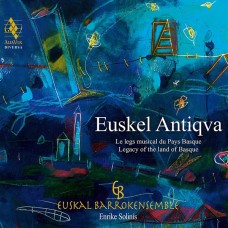您的購物車沒有添加專輯!
搜尋
巴斯克音樂遺產 巴斯克巴洛克合奏團 Euskal Barrokensemble / Euskel Antiqva
|
The term “Euskal Herria” defines the people who have “Euskera” (Basque) as their language. However, we prefer to use “Euskel” rather than the conventional “Euskal” because the fact that it appears in that form in the 16th century manuscript penned by Juan Pérez de Lazarraga somehow invites us to reflect on how words change over time, whereas the underlying reality to which they refer – in this case, the people whose common language gives expression to a particular socio-cultural world – remains unchanged. Basque art, incomparably rich in its influences, has given us above all a great quantity of popular music. The Basques are an eminently musical people, and this is one of the reasons why early music can be be a valuable vehicle for conveying the Basque legacy to the world – a world of disparaging labels which have failed to fairly represent many peoples with a rich cultural heritage, but who have been sidestepped by the world’s mainstream classification systems. This new window on the world of culture called “early music” gathers together the music and literature of other ages, revealing how high culture and popular culture often to a large extent shared a common space as well as the fact that so-called early music is the natural heir to popular music. The breadth and variety of the Basque songbook, and the country’s art forms such as literature, dance, painting and bertsolarismo, as well as classical music, of course, is in stark contrast to its presence in the artistic circles to which they naturally belong. Contrary to the opinion held in some quarters, Basque culture has always played a pioneering role in the field of art. In music, for example, as early as the 14th century it contributed to the development of musical notation, and in Renaissance times the Basque Country boasted some great composers, including Antxieta and Bizkargi, among others. In literature, there is a little-known but nevertheless substantial and varied body of Renaissance poetry in Basque (Etxepare, Lazarraga, Leizarraga…) True to its vocation and to Basque culture, Euskal Barrokensemble aims to present a cosmopolitan view of Euskel Herria and its links to the wider world, a people made up at many points in its history of Muslims, Jews and Christians, distinctively reflected in a language and an art which are central to that great thoroughfare of European art that was the Pilgrims’ Way to Santiago. A clearly distinct people with one of the most ancient and unclassifiable languages in the world, a range of musical instruments so similar to and yet so different from those of neighbouring peoples, and which developed its art simultaneously with that of its neighbours: that is the image that we wish to convey of our culture. A Basque art which in the past had links to fashionable European currents; one which was often ahead of its time; and one which was also often complacent in its natural remoteness and introspection. A culture which, in the Renaissance, was slow to come to terms with the new face of Christianity, which clashed head-on with the Basque Country’s ancestral way of life and beliefs. A people who, despite their outstanding tradition of oral artistic expression, can also boast a rich tradition of written culture, both literary and musical. To fully experience Basque culture means enjoying all the many facets of Basque art, as well going out into the world to enjoy and learn from other cultures at the same time as we blend with them. We wish to thank all the artists without whose talent and personal commitment this project would obviously not have been possible. The members of Euskal Barrokensemble have been overwhelmed by the selfless enthusiasm that each artist has brought to the enterprise. A totally altruistic art devoted to the pursuit of happiness. Eskerrik asko. Thanks to: Izaskun, Klarita and company, from the Chapel of San Blas de Tolosa. To amama, aitite, amona, Kontxi, Irene and Juantxo. To Kristina Martija, Patri Urkizu, Jon Bagües, Eresbil (Basque Music Archives), the Etxepare Institute and the Basque Government. And to all those whose help and collaboration have made this Project possible. ENRIKE SOLINÍS & MIREN ZEBERIO Translation: Jacqueline Minett |
|
1. Kontrapas Bernart Etxepare / Herrikoia 2’29 2. Perutxoren Kantua Gaspar Gómez (1536) / Traditional 2,40 3. Sibilaren Profezia Joanes Etxeberri (s. XVI) / Liturgic Song 4’00 4. Aragueako Petrika - Traditional 1’09 5. Janzu Janto Cancionero de Palacio (c. 1500) 2’10 6. Zure begiok nekusenean Joan Pérez de Lazarraga (1567) 0’57 7. Ürrütiko Kantorea - Traditional 3’57 8. Urruska Fandangoa - Traditional 1’57 9. Izan nüzü Prantzian - Trad. / Juan Vásquez 2’39 10. Con amores, la mi madre - Johannes de Antxieta (1462-1523) 3’46 11. Cantar de Urrejola - J. P. de Lazarraga / Trad. 1’13 12. Gaiza Zenduan Lenizanok - Trad. / Anonymous song 3’35 13. Ternuako porrue - Traditional 1’35 14. Acuerdo de Judimendi - Jewish Traditional Song 2’30 15. Ave Sanctissima Maria - Johannes de Antxieta 2’23 16. Koumis-Ezpatadantza - Trad. / Tabassian 3’48 17. Hamar Manamenduiak - uis Alberto de Gómez (s. XVI) 1’32 18. Salve Regina - Gonzalo Martínez de Bizkargi (1463-1528) 2’14 19. Sonata en Re - Mateo Pérez de Albéniz (1755-1831) 2’42 20. Dianea Joan - Pérez de Lazarraga (1567) 0’46 21. Barri Onak Dakart - Mss. J.P. de Lazarraga / F. De Salinas (1513-1590) 1’57 22. Bralea - Traditional 2’36 23. Argizagi ederra - Traditional 2’25 |
編號 |
曲目 |
長度 |
作詞 |
作曲 |
演奏 |
樂團 |
演唱 |
指揮 |
試聽 |
|---|


